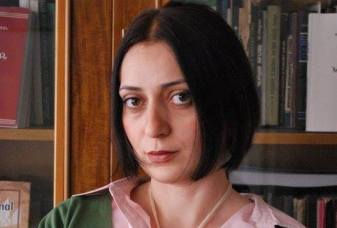“One Day Russia will Reconcile with Turkey and the Armenian Issue will be Forgotten in Russia”

Araks Pashayan, PhD of Yerevan State University (YSU), expert on Arabian studies, is the interviewee of 168.am.
-Mrs. Pashayan, a few days ago Russia-West accord on cease-fire in Syria came into force, which is qualified as a useless document by Armenians in the very focus of war in Syria,. The thing is, the most serious forces in Syria are exactly IP and Al-Nustra groupings, which are out of the accord. However, a big agreement has been concluded. How will this accord change Syrian crisis?
Agreement between the USA and Russia, I think, is a real accomplishment of historical importance, despite the fact, to which extent it’s going to be productive, if we take into account the fact, that Russia and the USA basically represent different allies and had contradicting standpoints on Syrian issue before. The accord is unprecedented for the last five years. It’s not a secret that there are fears on both sides, that cease-fire won’t work. And it’s reasonable, as Syrian issue is the most complicated conflict of current phase, with wider international engagement—both regional and extra-regional.
Syria has turned into a global war platform, where interests and concerns of various states, nations, tribes and clans are clashed. Currently there are lots of uncontrollable territories, which are not only places for military operations, but also zones of international crime and trafficking. These are “states” inside the state. So, establishing peace in Syria isn’t an easy thing. From this standpoint rapprochement of interests of the USA and Russia may be beneficiary for Syria. We need to wait.
-Analysing existent accords on Syria for the recent period, what can you say? Is there an international accord on Syria’s future?
The most ideal variant would be resolution of Syria’s destiny exactly in Syria and by Syrian citizens. As it’s resolved out of Syrian borders, that’s why it fails. Unfortunately, it turned out, that Syria’s future is in the hands of Er-Riad, Ankara, Qatar and others. Firstly, this is a big tragedy for Syrian people. However, in my conviction, one of the most balanced documents on Syria is UNO Security Council Resolution 2254 (2015), which developed a road map for Syrian issue settlement, proposing the government and the opposition to negotiate, hold elections within 18 months, develop new constitution and etc. Of course, everything is nice on paper, but while implemented, it fails. Up to day, for instance, it’s not clear, who are real Syrian opposition, as they don’t have a unified center, they are funded by various centers. It’s not clear, with whom the government should negotiate. There are oppositions funded by Er-Riad, Moscow, Ankara, Cairo, i.e. Syrian mosaic is rather complicated. The opposition is also overwhelmed with ethnic and religious elements.
-What is the role of regional power centers regarding present-day crisis? How do they attempt to contribute to the issue settlement?
In development and further extension of Syrian crisis the most negative role had the very regional states, firstly, Turkey, Saudi Arabia and Qatar, who were in friendly ties with Damascus before the Syrian war. Likewise U-turn was unexpected, however, it happened. With the help of these states and their allies Syria was unrooted, lost its territorial integrity and sovereignty. Iran was one of the targets this Sunni trio, i.e. Syria became the victim of Sunni and Shia geo-political alliance. On the other hand in-Islam contradictions, lasting and harsh competition between Iran and Saudi Arabia contributed to external interference of the Middle East, sharpening of other conflicts in Yemen and etc. As a result, national security system of the Middle East collapsed or emerged in fragile balance, postponing its development for more than dozen years. Syrian war cast a final blow to the idea of both Arabian and Islamic peace. So at present, these states won’t support but will try to suspend establishment of peace in Syria, as immense resources have been introduced. If funding and equipping of anti-governmental forces stops, to all probabilities, Syrian war will end.
-On account of recent developments, i.e. the accord, what implications may we expect in our region from Russia-Turkey tension and terror groupings, against which Russia operates in Syria. There are viewpoints that terror groupings may try to revenge from Russia through Armenia. How realistic are they?
Armenia is a part of big Middle East; we live in a rather explosive region. Although war seems too far from us, it’s too close. Our compatriots in Aleppo, Damascus, Kessab, Latakia, Qamishli every day feel immediate and hard implications of war. From national security standpoint, for Armenia, of course, there are threats. In various historical periods Russia-Turkey rapprochement and confrontations have strictly negative implications for us. We also should emotionally respond to Russia-Turkey confrontation, discourse around it and tec. I’m sure, one nice day Russia and Turkey will reconcile, and Armenian Issue will be forgotten in Russia. We should also be ready to counteract possible activation of the Islamic factor in Nagorno-Karabakh issue.
-Some Western experts, highlighting participation of all parties and communities in settlement of the conflict, expressed concerns, that maybe Armenia expresses Russia’s standpoint on account of Armenian-Russian ties. On account of interests of Armenian community, what do you think, which should be a safe disposition of Syrian community?
Armenians of Syria are citizens of that country, and until this day they’ve equally suffered from the war, relived catastrophe, like other Syrians. Despite the fact of Russia’s engagement with Syrian war, just from the very start Armenians had and have their disposition. They have always supported Bashar al-Assad’s regime, which, I suppose, means supporting Syria’s statehood, sovereignty, independence, development and progress. Unfortunately, Armenian communities of Syria, and generally of the Middle East, are not the ones they used to be and can’t be. Armenians, who didn’t migrate, currently face the issue of survival. Sadly enough, Armenia failed to keep Armenians of Syria in Armenia, like Armenians of Iraq. We failed in this. They would only enrich Armenia with their experience and investments, like it happened after 1946. Instead, Canada welcomed Armenians of Syria with arms open.
By Araks Martirosyan

























